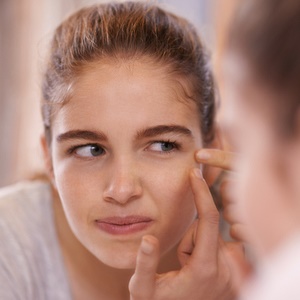
As if the start of a new school year isn't stressful enough, many teens may find their acne worsening when classes start, a skin doctor says.
During summer holidays, acne often eases because teens have less stress and more sun exposure, but it could flare up now that they're back in school, explained Dr David Shupp. He's a dermatologist at Penn State Health Medical Group.
Girls more susceptible
"A teen often feels alone in suffering from embarrassing pimples," Shupp said in a Penn State news release.
"Because acne is caused primarily by hormone levels, the condition often begins at puberty and clears up by the late 20s," he added. "Girls are more susceptible than boys to hormone-related acne."
For teens with mild acne, the first step is to try over-the-counter creams, gels or lotions applied directly to affected areas. Teens with other skin conditions – such as eczema or psoriasis – should consult their doctor before using over-the-counter acne medications, Shupp advised.
The most common over-the-counter acne medications contain:
- Benzoyl peroxide, which kills bacteria, helps remove excess oil from the skin and reduces inflammation.
- Salicylic acid, which dries excess oils and works best for blackheads and whiteheads.
- Adapalene, which prevents plugging of hair follicles and is available over-the-counter in 0.1% strength.
"If over-the-counter medications don't provide enough relief from acne, it's time to discuss prescription medications with a dermatologist or family physician," Shupp suggested.
Prescription acne treatments include:
- Stronger retinoids, such as Retin-A. These are among the most effective topical medications but can be more drying than over-the-counter options.
- Antibiotics, which can be administered orally or via a topical gel or cream to kill excess bacteria. Topical antibiotics are often combined with benzoyl peroxide to maximize effectiveness while lowering the risk of antibiotic resistance.
- Hormonal treatments, which impact the balance of hormones that cause acne and are usually prescribed to supplement topical medications or antibiotics in young women.
- Isotretinoin (Accutane) is a powerful vitamin A derivative used to treat severe acne that does not respond to other medications. Potential side effects include birth defects, so teenage and adult women taking this oral medication must undergo monthly pregnancy tests.
Don't use acne medications prescribed for someone else, Shupp said.
Along with treatment, there are a number of things teens can do to reduce acne, he added.
Permanent scarring
Gently clean affected skin twice a day. Avoid scrubbing, which can damage the skin and aggravate an acne problem. Do not use abrasive products.
Use oil-free cosmetics, sunscreen, moisturizer and hair products. They're labelled "noncomedogenic".
Keep hands and hair away from the face to reduce the transfer of oil. Don't squeeze pimples. This can cause permanent scarring.
The most common skin condition in the United States, acne strikes close to 85% of people between the ages of 12 and 24, according to the American Academy of Dermatology.
Image credit: iStock




 Publications
Publications
 Partners
Partners















